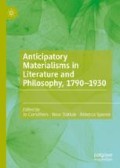Abstract
The fiction of Willa Cather, written in the first half of the twentieth century, takes as a recurrent theme the human settlement of wilderness. This chapter frames her attention to how people make homes as importantly materialist, in ways that anticipate contemporary materialist thought. She carefully depicts the activities of patient, aesthetically attuned labour, where these activities build bridges between homes and cultures settlers have left behind and transformed practices that enable them to make a new home. The gradual accumulation of meaningful practices is insistently material in Cather’s fiction. Characters who succeed in making homes integrate efforts to sustain humanly meaningful life with whatever the natural environment demands and offers. Making a home requires transformative interactions between human and non human nature.
Access this chapter
Tax calculation will be finalised at checkout
Purchases are for personal use only
Notes
- 1.
I think that Cather can also be interestingly linked, for instance through her portrayals of women farmers, to work that has had some influence within new materialism, such as writings by Wendell Berry (1987), a modern “agrarian”, and the research of Iris Marion Young (2005), a feminist phenomenologist who paid attention to female physical comportment and competence.
- 2.
Jane Bennett’s “vital materialism” is suggestive here. She argues for forms of agency in all matter: “All bodies become more than mere objects, as the thing-powers of resistance and protean agency are brought into sharper relief” (Bennett 2010, 13). Vital materialists “try to linger in those moments during which they find themselves fascinated with objects, taking them as clues to the material vitality they share with them” (Bennett 2010, 17). Cather’s relation to such a view of vitality and agency in matter is not obvious but would be interesting to explore. Her teeming forest evokes a kind of vitalism, and I would say her fiction conveys a fascination with the forms of resistance and potential in different physical stuffs. There is also, however, a sense in which she seems fascinated by the distinctiveness of human agency as it runs into the “otherness” of obdurate matter.
- 3.
See also Schiller 1983, especially Letters 26 and 27.
Bibliography
Alaimo, Stacy, and Susan Hekman. 2008. Introduction: Emerging Models of Materiality in Feminist Theory. In Material Feminisms, ed. Stacy Alaimo and Susan Hekman, 1–19. Bloomington: Indiana University Press.
Bennett, Jane. 2010. Vibrant Matter: A Political Ecology of Things. Durham, NC: Duke University Press.
Berry, Wendell. 1987. Home Economics. San Francisco: North Point Press.
Cather, Willa. 1931. Shadows on the Rock. New York: Alfred A. Knopf.
———. 1957 (1923). “Nebraska: The End of the First Cycle.” The Nation 117, September 5, 1923. In Roundup: A Nebraska Reader, ed. Virginia Faulkner, 1–8. Lincoln: University of Nebraska Press. https://culturesoftheamericasblog.files.wordpress.com/2016/10/cather-nebraska-end-of-the-first-cycle.pdf.
———. 1963 (1913). O Pioneers! London: Hamish Hamilton.
———. 1981. Death Comes for the Archbishop. London: Virago.
———. 2006 (1918). My Ántonia. Oxford: Oxford University Press.
Coole, Diana, and Samantha Frost. 2010. Introducing the New Materialisms. In New Materialisms: Ontology, Agency, and Politics, ed. Diana Coole and Samantha Frost, 1–43. Durham, NC: Duke University Press.
Cronon, William. 1996. The Trouble with Wilderness; or, Getting Back to the Wrong Nature. In Uncommon Ground: Toward Reinventing Nature, ed. William Cronon, 69–90. New York: W. W. Norton.
Hegel, G.W.F. 1975. Hegel’s Aesthetics: Lectures on Fine Art. Vol. 1. Edited and Translated by Thomas Knox. Oxford: Oxford University Press.
Kant, Immanuel. 2013. Critique of the Power of Judgment. Edited by Paul Guyer. Translated by Paul Guyer and Eric Matthews. Cambridge: Cambridge University Press.
Millington, Richard. 2005. Willa Cather’s American Modernism. In The Cambridge Companion to Willa Cather, ed. Marilee Lindemann, 51–65. Cambridge: Cambridge University Press.
New York Times. 1947. Obituary for Willa Cather. April 25.
Reynolds, Guy. 2005. Willa Cather as Progressive: Politics and the Writer. In The Cambridge Companion to Willa Cather, ed. Marilee Lindemann, 19–34. Cambridge: Cambridge University Press.
Schiller, J.C.F. [1795] 1983. On the Aesthetic Education of Man: In a Series of Letters. Edited and Translated by E. M. Wilkinson and L. A. Willoughby. Oxford: Clarendon Press.
Young, Iris Marion. 2005. On Female Body Experience. Oxford: Oxford University Press.
Acknowledgements
Thanks to Jo Carruthers, Nour Dakkak, Emma Mason, Sarah Moss, Jonathan Skinner, Becky Spence and anonymous readers for crucial help with this chapter. Thanks also to all of the speakers at the Anticipatory Materialisms Symposium for an excellent exploratory and collaborative conversation.
Author information
Authors and Affiliations
Corresponding author
Editor information
Editors and Affiliations
Rights and permissions
Copyright information
© 2019 The Author(s)
About this chapter
Cite this chapter
John, E. (2019). Making Human Homes: Willa Cather on People and Wilderness. In: Carruthers, J., Dakkak, N., Spence, R. (eds) Anticipatory Materialisms in Literature and Philosophy, 1790–1930 . Palgrave Macmillan, Cham. https://doi.org/10.1007/978-3-030-29817-3_11
Download citation
DOI: https://doi.org/10.1007/978-3-030-29817-3_11
Published:
Publisher Name: Palgrave Macmillan, Cham
Print ISBN: 978-3-030-29816-6
Online ISBN: 978-3-030-29817-3
eBook Packages: Literature, Cultural and Media StudiesLiterature, Cultural and Media Studies (R0)

